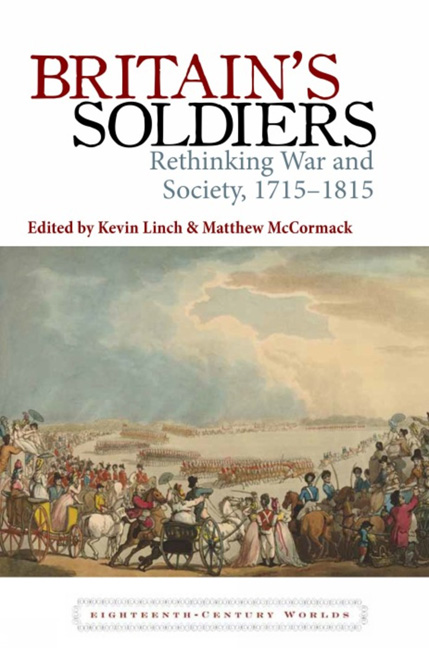Book contents
- Frontmatter
- Contents
- List of tables and figures
- Acknowledgements
- Notes on the contributors
- Introduction
- Part 1 Nationhood
- 1 The Eighteenth-Century British Army as a European Institution
- 2 Soldiering Abroad: The Experience of Living and Fighting among Aliens during the Napoleonic Wars
- Part 2 Hierarchy
- Part 3 Discipline
- Part 4 Gender
- Part 5 Soldiers in Society
- Index
2 - Soldiering Abroad: The Experience of Living and Fighting among Aliens during the Napoleonic Wars
from Part 1 - Nationhood
- Frontmatter
- Contents
- List of tables and figures
- Acknowledgements
- Notes on the contributors
- Introduction
- Part 1 Nationhood
- 1 The Eighteenth-Century British Army as a European Institution
- 2 Soldiering Abroad: The Experience of Living and Fighting among Aliens during the Napoleonic Wars
- Part 2 Hierarchy
- Part 3 Discipline
- Part 4 Gender
- Part 5 Soldiers in Society
- Index
Summary
BRITANNIA, proverbial land of freedom, tolerance and safe-haven for political refugees, has long found it difficult to deal with strangers. It is no accident that the English language has a word for foreigners that in modern parlance has become associated with everything that is weird and even extra-terrestrial: aliens. As early as 1712, Joseph Addison noticed that the conviction that Britons could stand proud and alone among nations, disdainful of and impervious to foreign influences was among the many ‘honest prejudices which naturally cleave to the heart of a true Englishman ’. Keeping this conceit among the military could not have been easy in the long eighteenth century. The vast majority of the conflicts in which British soldiers were involved during the period 1750–1815 took place abroad, bringing them into unprecedented contact with foreign cultures and manners. This encounter with ‘the other’ presented a wide range of challenges and dilemmas, more noticeable among those who took the decision to serve in foreign armies – a step by which they joined, perhaps more consciously than others, ‘Military Europe’, the international occupational fraternity outlined by Stephen Conway in chapter 1.
This chapter will examine some of the experiences of British soldiers who joined the Spanish and French forces as volunteers during the Napoleonic Wars. They constituted a small number of men, mainly officers: forty-two in the case of those Britons who fought under the Spanish flag from 1808 to 1814, and perhaps less than a hundred in the Irish Legion, created by a decree of Napoleon on 31 August 1803 and disbanded on 28 September 1815. Indeed, despite its name, it appears that less than half of the Legion was ever able to claim any Irish connection. So we are not here confronted by a phenomenon of large-scale emigration to volunteer for war abroad. The British Army remained the first employer of choice in the military, particularly in the case of the Irish, who made up 28 per cent of the British Army during the Peninsular War, a figure that had risen by 1830 to 42.2 per cent of British recruits. Nonetheless, there is much to be learnt from the study of the experiences of those who could be considered the exception that confirms the rule.
- Type
- Chapter
- Information
- Britain's SoldiersRethinking War and Society, 1715–1815, pp. 39 - 54Publisher: Liverpool University PressPrint publication year: 2014



